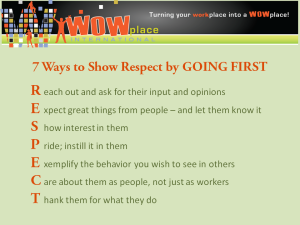When it comes to respect, I have two words for you: GO FIRST
We all want to be shown respect; it’s a natural human condition. However, too often when we hear about respect (or a lack thereof), it’s because someone is looking for respect FROM others without looking inward to what they’re doing to outwardly show respect FOR others in return. In fact, how much respect we’re shown by others often depends on how much respect we demonstrate to them… not in return, but first.
Two movies come to mind to illustrate this point: The Freedom Writers and The Ron Clark Story. Both are stories of teachers who went into inner-city schools to try to change the outcomes for those students, most of whom dropped out before finishing school. But the students didn’t want their help; in fact, they actively disrespected the teachers in an effort to get them to quit and leave the students alone. But these teachers summoned extraordinary courage – even in the face of active disrespect – and kept their eye on the goal. Moreover, they knew they had to go first and show the students respect before any respect would be offered back to them. By recognizing that someone had to go first… and it wasn’t going to be the students… they were able to accomplish their objectives and make a difference in the lives of countless students.
Here are 7 simple ways we can show RESPECT to others by GOING FIRST:
R – Reach out and ask for their opinions, views, advice and contributions. One of the things that all humans have in common is the desire to be valued, listened to and appreciated. Valuing their input enough to ask for it shows them respect and helps them feel as though they’re making a difference… that they matter.
E – Expect great things from them – and let them know about it. When we lower our expectations of others, we’re basically sending the message that we don’t think they’ll amount to much, or that we can’t count on them. But when we tell them we expect great things from them, they often rise to the “challenge.” This is partly due to the fact that they don’t want to “disappoint” the other person, but partly because it signals that someone sees something special in them (even if they don’t see it in themselves) and helps them raise their own expectations and results.
S – Show interest in them. This lets them know that you value them enough to develop a relationship with them. One of the biggest ways to “dis” someone is to act as though they don’t even exist, or that their life and activities aren’t important enough to even ask about. As leaders, when we give others more than just a passing glance or a simple “hello” each day, it tells them that they are important enough to be noticed and engaged in a conversation. You don’t have to get into every excruciating detail of their life, but simply saying “Hello” does not a relationship make.
P – Pride: instill it in them. How often do you second-guess yourself: Am I good enough? Smart enough? Patient enough? Educated enough? We all question ourselves on a regular basis, especially when we’re trying something new (which, unless we’re stagnating and becoming irrelevant, we are constantly doing). One of the best things we can do is to instill pride in people by letting them know what they’re doing well (even if it’s not perfect yet). Refrain from micro-managing or taking over a project because “it’s easier and faster to do it myself.” By letting them know they’re on the right track, coaching them regarding any corrections that may be necessary to keep them there, and then letting them find their own path to success, we allow them to feel pride in themselves for a job well done.
E – Exemplify the behavior you wish to see in others. There can be no hint of the “Do as I say, not as I do” mentality that has existed in organizations for too long. If team members don’t perceive a strong emphasis on fairness in the workplace, they won’t stay; even if they do stay for a while, you’ll never get the best they have to offer because no one respects someone who believes they can operate “above the rules.”
C – Care about others as people, not just about their performance as workers/co-workers. Of course, there is a need for everyone to perform at the highest levels of efficiency, effectiveness and productivity. However, if all we’re doing is looking at their performance on the job, we may miss subtle signs of stress, distraction and other factors that could negatively impact their performance… but could be helped with just a little human caring and compassion to uncover and assist with resolving the problem.
T – Thank people for what they do. No one wants to be in a thankless relationship – personal or professional. Most of us don’t do our jobs well simply to receive thanks; we do our jobs well because we’re proud of who we are, what we do and how we do it. That said, it’s awfully nice to hear it once in a while, isn’t it? Hearing “thank you” lets us know that we’re not being taken for granted, that we’re making a difference, and our efforts are noticed and appreciated.
If we want to increase respect in this world, we must all ask ourselves: what am I doing to show respect to others on a regular basis? Am I making a habit of going first? What could I inadvertently be doing that could be interpreted as disrespect?
If we focus on this, make it a habit, and continually improve in this area, we’ll all be surprised by how much respect we get in return, if we will only GO FIRST.


